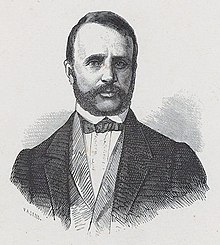Antonio Carlo Napoleone Gallenga
Antonio Gallenga | |
|---|---|
 Gallenga in 1861 | |
| Born | 4 November 1810 Parma |
| Died | 17 December 1895 (aged 85) Llandogo |
| Occupation | writer |
| Language | English |
| Nationality | Italian |
| Alma mater | University of Parma |
Antonio Carlo Napoleone Gallenga (1810–1895) was an Italian author and patriot.
Life
[edit]He was born at Parma on November 4, 1810. He was the eldest son of a Piedmontese of good family, who served for ten years in the French army under Masséna and Napoleon.[1]
He had finished his education at the University of Parma, when the French Revolution of 1830 caused a ferment in Italy. He sympathized with the movement, and within a few months was successively a conspirator, a state prisoner, a combatant and a fugitive. For the next five years he lived a wandering life in France, Spain and Africa. In August 1836, he embarked for New York,[2] and three years later he proceeded to England, where he supported himself as a translator and teacher of languages.[1]
In 1854, through Cavour's influence, he was elected a deputy to the Italian parliament. He retained his seat until 1864, passing the summer in England and fulfilling his parliamentary duties at Turin in the winter. On the outbreak of the Austro-Sardinian War of 1859, he proceeded to Lombardy as war correspondent of The Times. The campaign was so brief that the fighting was over before he arrived, but his connection with The Times endured for twenty years. He was a forcible and picaresque writer, with a remarkable command of the English language. In 1876, he was the first to describe, along with Edwin Pears, the Turkish atrocities in Bulgaria for the British public.[3][4][5] He materially helped to establish that friendly feeling towards Italy which became traditional in England.[1]
In 1859, Gallenga purchased the Falls, at Llandogo on the Wye, as a residence, and to there he retired in 1885. He died at this house on December 17, 1895. He was twice married.[1]
Works
[edit]Among his chief works are
- Italy Past and Present (1848);
- Historical Memoir of Frá Dolcino and his Times (1853);
- History of Piedmont (3 vols., 1855;
- Italian translation, 1856);
- Country Life in Piedmont (1858);
- The Invasion of Denmark (2 vols., 1864);
- The Pearl of the Antilles [travels in Cuba] (1873);
- Italy Revisited (2 vols., 1875);
- Two Years of the Eastern Question (vol. 1 & vol. 2, 1877);
- The Pope [Pius IX] and the King [Victor Emmanuel] (2 vols., 1879);
- South America (1880);
- A Summer Tour in Russia (1882);
- Iberian Reminiscences (2 vols., 1883);
- Episodes of my Second Life (1884);
- Italy, Present and Future (2 vols, 1887).
Gallenga's earlier publications appeared under the pseudonym of Luigi Mariotti.[1]
References
[edit]- ^ a b c d e Chisholm 1911.
- ^ Iannuzzi, Giulia (2018). An "Eye-talian" in the New World: Cognitive Estrangement and Diglossia in Antonio Gallenga's Early Italian American Narrative. Bordighera Press. ISBN 9781599541167.
- ^ Pears, Edwin (1916). Forty Years in Constantinople, The Recollections of Sir Edwin Pears 1873-1915 (1 ed.). London: Herbert Jenkins Limited. p. 16. Retrieved 29 July 2016 – via Internet Archive.
- ^ Washburn, George (1909). Fifty Years in Constantinople and Recollections of Robert College (1 ed.). Boston & New York: Houghton Mifflin Company. p. 104. Retrieved 29 July 2016 – via Internet Archive.
- ^ Schuyler, Eugene (November 1885), "United Bulgaria", The North American Review, vol. 141, University of Northern Iowa, pp. 464–474, JSTOR 25118547
Attribution: This article incorporates text from a publication now in the public domain: Chisholm, Hugh, ed. (1911). "Gallenga, Antonio Carlo Napoleone". Encyclopædia Britannica. Vol. 11 (11th ed.). Cambridge University Press. p. 417.
Sources
[edit]Toni Cerutti: Antonio Gallenga. An Italian writer in Victorian England. London [etc.]: Oxford University Press for the Univ. of Hull, 1974.
